From working-class hell via convent purgatory to Florentine comic heaven, the riches of Puccini's most comprehensive masterpiece seem inexhaustible. In a production as detailed in its balance between the stylised and the seemingly spontaneous as Richard Jones's, first seen in 2011, there are always going to be new connections between the three operas to discover. Some things are stronger, some weaker second time around, but you still come away convinced that each work glows best in its original context, and that none should be prised away.
Two of the three leading ladies are new to the revival, but the one who showed so much promise first time round gives the most unusual performance. Albanian soprano Ermonela Jaho confessed in a recent interview that last time she was learning the eponymous role of Suor Angelica, the nun confined by her family for the disgrace of an illegitimate child, more or less as she went, replacing the keenly-anticipated Anja Harteros at short notice, but that this would be a much more nuanced interpretation.
You can say that again. This time so much was sung, as Italians would put it, con intimissimo sentimento, "with the most intimate sentiment", daringly quiet, not least most of the heart-rending aria "Senza mamma", in which the traumatised Angelica mourns over her dead son having died without a mother's consolation. So there's no question of mawkishness (in fact I've always found this tale of convent life and death devastatingly truthful, helped by the fact that Puccini consulted his sister, a nun, over detail, and that her colleagues all debated forgiveness over the suicide). When Jaho's Angelica lashes out, then, the power is all the greater. Contrition and humility don't come easily to this girl who's had to give up everything.
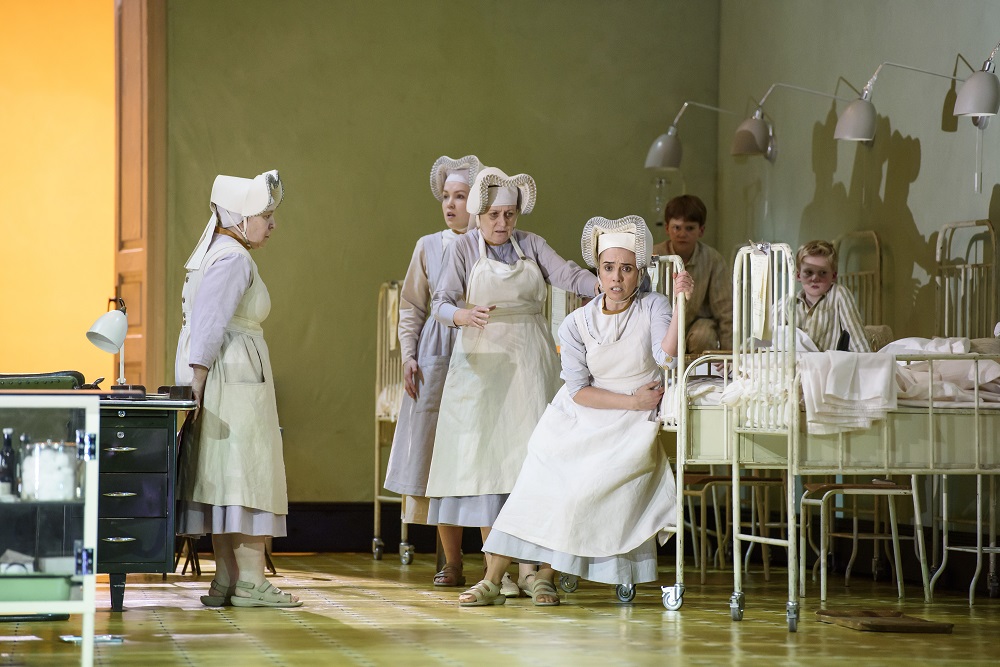
Vocally, the sound can be cloudy, especially as contrasted with the bright ring of Lauren Fagan's Sister Genovieffa, surely an Angelica in waiting. But the fast vibrato which troubled Jaho last time is nowhere in evidence, and the top notes are incandescent. Angelica's central conflict with the rigid "morality" of her aunt, La Principessa, is more compelling than before. Anna Larsson cuts a handsome figure, and Jones's pure choreography, loyally realised by his excellent protégée Sarah Fahie, is at its strongest here in the contrast between stillness and decisive steps across the stage. The simple clutching of the heart as Larsson's Princess departs tells us that the woman isn't just a monster.
Silence on stage, compounded by the quietest sounds from the Royal Opera Orchestra under Nicola Luisotti, can be even more devastating than the singing; Puccini's ineffable sense of timing and pace gives the cue. Though he always gets the players to colour beautifully, Luisotti can be rather over-indulgent with the purple passages, and too unrestrained in the thunder of the opening melodrama, Il tabarro (The Cloak). 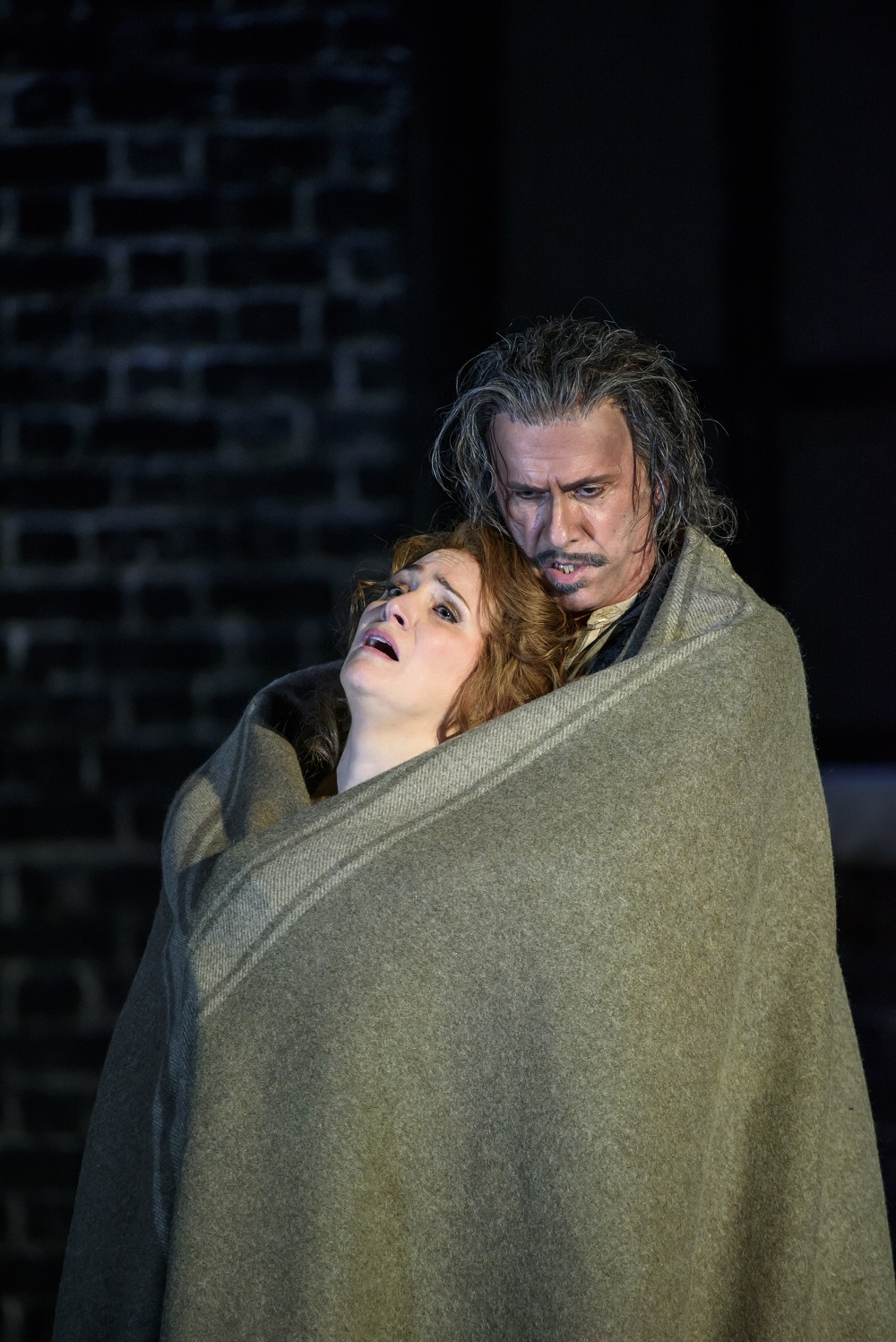 Fortunately Patricia Racette (pictured right with Lucio Gallo) as dissatisfied bargee's wife Giorgetta, a brave replacement for the luminous Martina Serafin, shows her usual excellent diction and mid-range clarity to ride the orchestra. The tone may not always be pretty, but her economical, definite acting style tells us all we need to know about this worn-down woman's passion for a better life. Her reactions carry the one-dimensional, not very lustrous Carl Tanner as her socially-aware lover Luigi. Seen above from the Royal Opera balcony, Ultz's set reveals its genius the better, with the black hole in the middle of the barge providing a suggestion of hell and a barrier between the lovers when observed, compounded by the central dark alleyway and the contrast between quayside and mooring. As before, Jones's choice of three different designers - Miriam Buether lights up a nun-run children's ward, John Macfarlane handles Italian bad taste - pays off superbly.
Fortunately Patricia Racette (pictured right with Lucio Gallo) as dissatisfied bargee's wife Giorgetta, a brave replacement for the luminous Martina Serafin, shows her usual excellent diction and mid-range clarity to ride the orchestra. The tone may not always be pretty, but her economical, definite acting style tells us all we need to know about this worn-down woman's passion for a better life. Her reactions carry the one-dimensional, not very lustrous Carl Tanner as her socially-aware lover Luigi. Seen above from the Royal Opera balcony, Ultz's set reveals its genius the better, with the black hole in the middle of the barge providing a suggestion of hell and a barrier between the lovers when observed, compounded by the central dark alleyway and the contrast between quayside and mooring. As before, Jones's choice of three different designers - Miriam Buether lights up a nun-run children's ward, John Macfarlane handles Italian bad taste - pays off superbly.
Lucio Gallo's Michele is more powerful than before, but I'd still like to hear a dark bass-baritone in the role. And he has a problem with the two high Gs. The one in Gianni Schicchi doesn't matter so much, and having the same singer to play both central characters struck me this time: of course, it's the triumph of the working man, downtrodden and worn out in Il tabarro, resourceful enough to triumph over bourgeois prejudices in Schicchi. Surely this has to be the funniest of one-acters, all the stronger for Jones not overworking each gag (his revival director, reproducing every meticulous move in what must be a substantial book, is Benjamin Davis). If Jaho's Angelica encouraged gentle tears rather than barely-controlled sobs, this is a controlled riot fit for laughing out loud again and again.
The clutch of grasping relatives out to do something about defunct Buoso Donati's will is much the same as before (though there's a sadness that Robert Poulton is no longer with us). It's a luxury to have Rebecca Evans and Marie McLaughlin as the garishly-clad Italian wives, ravishing in the seductive-grasping women's trio as they dress Schicchi up to impersonate Buoso - and McLaughlin does a lovely linguistic kick at the end of her whispered enticement to make Schicchi give her a share in the real goodies.
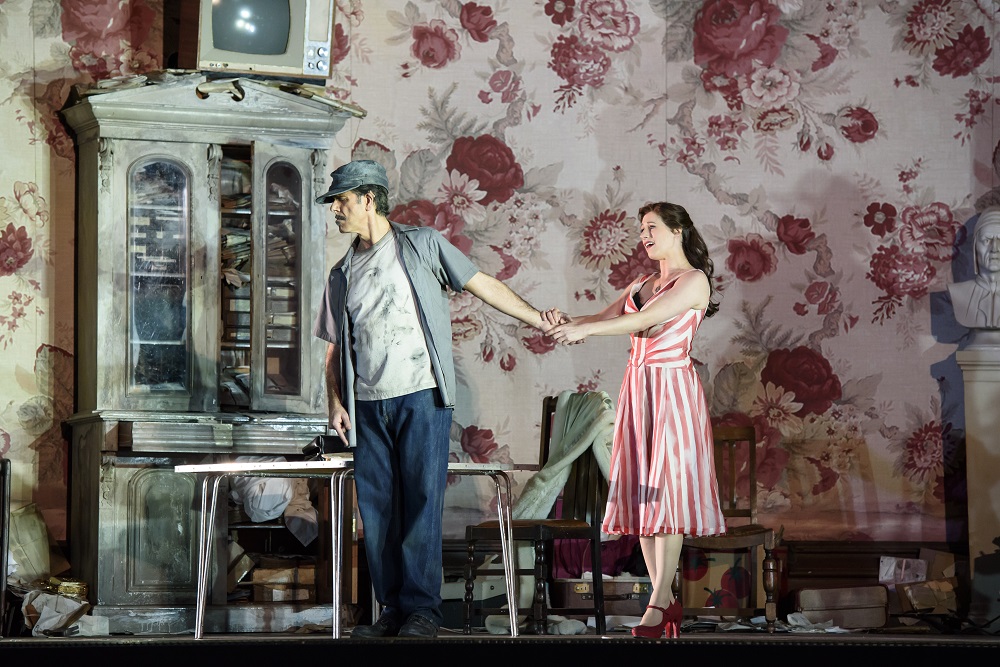
Elena Zilio is back to steal the show with her redoubtable chest tones and rapacious inflections as old cousin Zita, and we have two delightful new young lovers to represent May versus September: Paolo Fanale as a sweet, spunky Rinuccio, bouncing the awkwardly-ranged hymn to Florence with perfect zest, and Susanna Hurrell making her main Royal Opera stage debut as Lauretta (pictured above with Gallo), managing to sing the penultimate line of "O mio babbino caro" in an impressive single breath even given Luisotti's over-lingering speed.
This is where he seems at his least happiest. Pappano had the perfect measure of comic timing, Luisotti does not, yet at least, and there are a few hairy ensemble moments, not least the relatives getting a beat out of synch with the orchestra as they acclaim Schicchi and not to be persuaded back until the music comes to a temporary halt. Still, the way Schicchi pulls it off is sheer delight, the epilogue sung to Dante's bust worthy of the riotous applause Schicchi requests. The most uproarious comic opera of the 20th century, to be sure; and if you want to hear the best of the 21st so far, don't miss the Royal Opera at the Barbican next month in Gerald Barry's The Importance of Being Earnest.

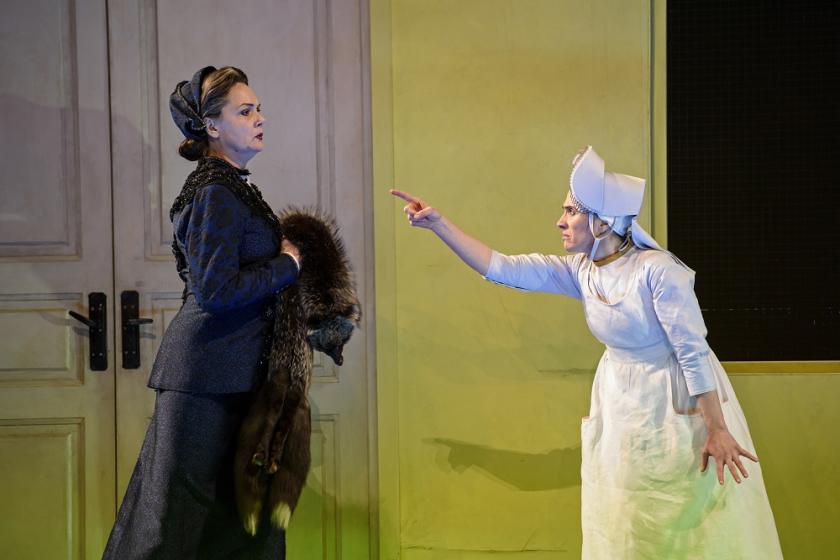












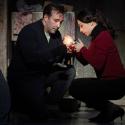
Add comment